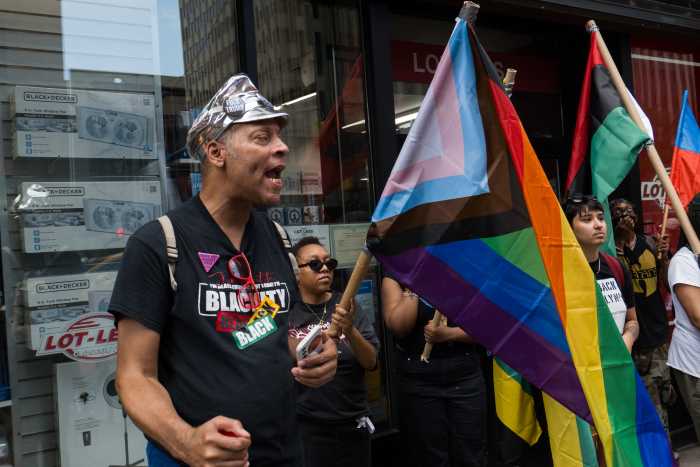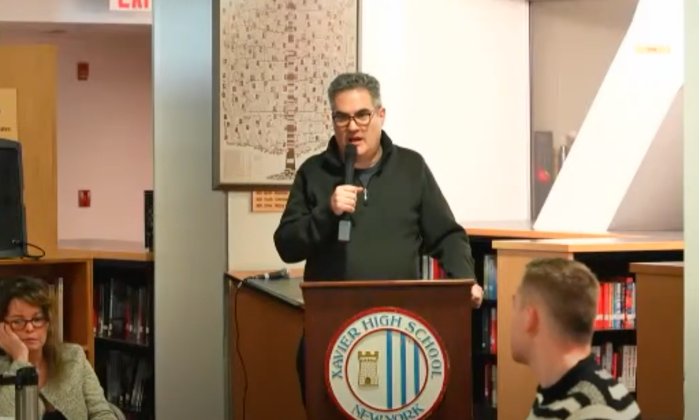Andy Hill, a pastor’s son who was long closeted, now leads LGBTQ Christians and hopes to integrate them more fully into his church’s life. | NATHAN DICAMILLO
Andy Hill was a pastor’s son who spent his childhood running away from being gay. He quit gymnastics because he was attracted to his teammates and coaches. He buried himself in playing piano instead.
But 30 years later, at 42, he’s given away his keyboard, he’s a cyclist and triathlete, and he runs a non-profit organization that connects LGBTQ Christians to each other called Grafted NYC.
“I never had confidence in my faith until I actually came out,” Hill said.
RELIGION & LGBTQ LIFE: How a pastor’s son was able to follow in his father’s footsteps only after he came out
Hill grew up as an Independent Baptist — a denomination more conservative than the Southern Baptist Church. His father was ordained through Bob Jones University, a school founded in part in opposition to the teaching of evolution in schools.
When Hill moved to New York City in 2000, he wanted to go to church, but he didn’t want a church like his dad’s church. This led him to Times Square Church, a charismatic non-denominational church in Manhattan’s theater district. A multiracial church, it was there that Hill first realized that the church could advance racial justice.
Unlike his experience with the Independent Baptists, Hill was taught that his salvation did not have to be earned by his good works. “Baptists — whether they articulate this or not directly — their approach to Christianity is you should pray the sinner’s prayer and then immediately turn your life around,” he said.
It was with his new understanding of his faith as something that he could do nothing to earn that Hill began to accept being gay.
One night, while he was praying again for God to make him straight, Hill was overwhelmed by the feeling that God wanted him to stop trying to pray the gay away.
Up until that moment, Hill had experienced an undiagnosed depression his whole life.
“It was all wrapped up in ‘I hate who I am, and I cannot accept this,’” he said.
When he accepted that he was gay, the depression stopped. Over the course of several months, Hill began saying to himself, “I’m gay.”
Hill didn’t start dating at that point, however. He identified as a celibate gay person because he believed having a relationship would be wrong.
In 2004, he switched churches. He began to attend Redeemer Presbyterian Church on the Upper East Side.
To help him remain celibate, Hill had to keep his feelings under control. He didn’t want to fall in love and kept people at an emotional distance as a result.
These were the circumstances under which Johnson Lee, now a Grafted NYC Bible study leader, met Hill back in 2005. At the time, Lee was also in the closet. Looking back, he can see how Hill’s self-loathing made him distant.
“I was trying to figure things out… a year after graduating college,” Lee said. “And he was also totally in denial.”
But at Redeemer, Hill became a deacon — a minister just below the level of pastor or priest. He couldn’t counsel church members effectively while staying emotionally distant.
On top of being challenged by his position as a deacon, Hill was laid off from his job because his bosses “thought [his] job was X when it was really Y,” he said. Now, he had a lot more time to think about his life.
It was during this period that Hill realized he had been missing a large part of who he was as a person — someone he believed to be created and loved by God.
“I basically had been repressing myself for so many years, I couldn’t see who I was anymore,” he said. “Which takes me back to who I was as a child, naturally prone to athletics, naturally extroverted, naturally leader at church as the pastor’s kid. All those things were the natural me. Everything I had done in the years between then and 37 was all an attempt to be straight or erase my homosexuality.”
The sermons at Redeemer, however, taught Hill that his salvation again was not earned by good works. The Independent Baptist thinking of his youth could no longer condemn him to Hell. He was free to think about how his repressing his identity had hurt him.
“I felt like I had nothing left to lose in terms of asking questions of whomever I could ask,” he said. “I didn’t have a job at that point, and my term as a deacon was coming to an end.”
He called a meeting with the church leaders.
“I told them, ‘You guys told me years ago that you don’t believe in reparative therapy, but there’s got to be gay people at this church and you’re not giving us a way to know each other,’” Hill recalled.
For a church that has a whole series about how Christians can integrate their faith into their careers and taught that evolution wasn’t contrary to the Christian faith, Hill wanted to know why Redeemer didn’t have a way of addressing modern issues like LGBTQ equality.
“I don’t know where to get answers,” he said. “All I know is sometimes I feel like God is talking to me, and sometimes I feel like I’m crazy.”
Andy Hill at the Grafted NYC booth at this past June’s Pride Fest in Manhattan. | NATHAN DICAMILLO
Around this time, LGBTQ Christian activist Matthew Vines came out with his book, “God and the Gay Christian,” and released materials challenging non-affirming churches with a different interpretation of scripture, challenging the notion that scripture condemns gay marriage.
Hill stepped down from being a deacon without fighting the church. But he did want to create a resource for gay Christians at Redeemer.
During this time, he joined a small group where two other people had already come out. This became the beginnings of an informal group of Christian LGBTQ people at Redeemer.
When Lee was invited to this group by a friend of his, he could see that Hill had changed in his openness to other people. At the time that this group was just a Facebook group Hill had a clear vision: That no one should reconcile their faith and sexuality alone.
“His intention was always ultimately to make it a place where people who are uncomfortable discussing these things at church would have a resource to do so,” Lee said.
Eventually, people from outside of the church began to take interest in the group. Hill realized that the group should be open for all LGBTQ Christians in the city and began to find more potential members through OkCupid.
“I was meeting gay Christians everywhere throughout the city because that’s what I was looking for,” he said. “My profile was very specific: I’m very passionate about God. I’m looking for someone like that too. For the most part, people would want to go on dates with me because I was like a curiosity.”
These people were the beginnings of a group that would be called Grafted NYC. The name comes from a passage in Romans that describes how wild olive branches are grafted into an olive tree so that the wild branches, along with the natural branches, can feed on the nutrients supplied by the roots and produce fruit. It’s a metaphor for inclusion within the Church and was used by the apostle Paul to say that gentiles — non-Jewish people — could have salvation through faith.
The nonprofit has two Bible study groups that meet on Thursdays in the Flatiron and Hell’s Kitchen, respectively. On every third Thursday of each month, the group has a social for all members. On one Saturday of each month, all non-male identifying members hold an event. Every quarter, Grafted holds a forum, usually a speaker event. More information can be found at graftednyc.com.
With members coming from a wide variety of denominations and cultural backgrounds, Hill also sees Grafted as a community that can help the church find unity in a politically divisive climate.
Hill is now a “gay Christian celebrity” — that was one of the early impressions his boyfriend, Joe Schleupner, had of him after they matched on OkCupid.
“He was among larger than life figures within this small community,” Schleupner, who grew up Pentecostal, said. “They are the more outspoken people that decided to move the needle while the rest of us are just meandering about.”
As a part of this mission, Hill is planning on going to seminary to pursue being a pastor.
“We talk about it a lot,” Schleupner said. “About my theology, his theology. His dreams for changing the way the church looks at unity, inclusion.”
Schleupner is also an athlete, and the couple are training for a triathlon together.
“Both of his bikes are named,” Schleupner said. “One is named Rodrigo for triathlons, and the other is a commuter bike named Tom Cruise.”
Being an athlete and an extrovert are the parts of Hill’s personality that were restored to him after accepting himself. In the five years that he has been out and affirming, Hill is free to do the work he feels called to do — uniting LGBTQ Christians.
“Embracing both realities makes us the cultural outcasts in both the gay and the Christian world,” he said about the Grafted community. “So we’ve become each other’s family.”




































